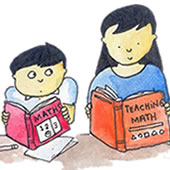Young Children’s Voices in Mathematical Problem Solving
Contributed by Dr Ho Siew Yin and Sng Wei Qin Abbie, from NTUC First Campus, for SingTeach Virtual […]
Read More
The issue of how teachers develope their knowledge has not received much attention in the educational community. Moreover, among the limited number of the studies available in this area, there are few, if not none, conducted within the educational settings of Asian countries such as Singapore.
 This study on Developing Professional Knowledge of Mathematics Teachers in Singapore was mainly intended to investigate how Maths teachers in our secondary schools develop their pedagogical knowledge.
This study on Developing Professional Knowledge of Mathematics Teachers in Singapore was mainly intended to investigate how Maths teachers in our secondary schools develop their pedagogical knowledge.
The study looked into the lives of participating teachers, including their school experiences, pre-service training and in-service experiences, to investigate the sources of their pedagogical knowledge.
Data was collected from 73 Maths teachers in 6 secondary schools (drawn from a stratified random sample from all 152 secondary schools in Singapore) through surveys, classroom observation, and teacher interview.
According to the National Council of Teachers of Mathematics, teachers’ pedagogical knowledge can be classified into three core components:
The findings indicated that there were various sources from which teachers developed their pedagogical knowledge. Their own teaching experience and reflection and informal exchanges with colleagues were the most important sources. In-service training, pre-service training and organised professional activities were the sources of secondary importance; and teachers’ experience as school students and reading professional journals and books were the least important ones.
The study provided us with valuable insight into Singapore Maths teachers’ learning and professional development.
In short, it is vital for teachers to learn for the job and learn on the job.
Acknowledgements
The author wishes to acknowledge the collaboration and support he received from Christina Cheong in conducting the study.